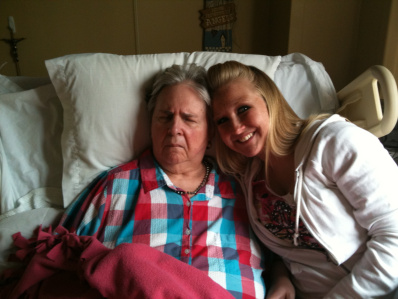
Comfort is ultimately the most important factor during late-stage Alzheimer’s
By Chris Berry
During the late-stages of Alzheimer’s communication becomes a major issue. Even when you talk slowly and calmly, it is common for the person suffering from late-stage Alzheimer’s to not understand what you are saying. Despite not understanding what you say, they will be able to “feel” sentimental acts like a massage, brushing their hair, a hug, or other pleasurable touching.
(Related: Alzheimer’s Disease and the Case For Copper)
Be attentive to expressions like a frown, or grimace or groan because they can still feel pain. Many months of caregiving will enable you to better sense when they feel pain, and how to best avoid it.
Eating also becomes extremely difficult during late-stage Alzheimer’s. Believe it or not, people in these stages can eventually forget how to swallow. Knowing this, try softer, pureed foods. Milkshakes and smoothies are a great solution. Always allow them to take their time to ensure that they don’t choke while eating.
Another common characteristic of those suffering from late-stage Alzheimer’s, is to be bedridden. If they are unable to turn themselves over, it is critical to turn them over frequently to avoid bed sores and comfort them.
(Related: Obamacare’s Impact On Michigan Seniors)
It is likely that they will also need to be bathed and fed during this stage of Alzheimer’s. Due to their inability to communicate, it is imperative that this type of care is administered without request.
Alzheimer’s is a slippery slope, as a result, comfort becomes the most important factor during this stage of Alzheimer’s. Music is often soothing. Soft, fluffy pillows and blankets can comfort, while warming socks can help ensure sound sleep.
(Related: Medicare Advantage Increases Popularity Despite Obamacare Cuts)
Lastly, be sure to encourage friends and family to visit frequently and in small numbers to deter loneliness.
Read more: http://free-alzheimers-support.com/wordpress/2011/03/6-things-to-know-about-late-stage-alzheimers/
Christopher J. Berry is a Michigan Alzheimer’s Planning planning lawyer and Medicaid planning attorney dedicated to helping seniors, veterans and their families navigate the long-term care maze. To learn more visit http://www.theeldercarefirm.com/ or call 248.481.4000
The post Late-Stage Alzheimer’s and Caregiver Expectations first appeared on SEONewsWire.net.]]>
Later-stages of Alzheimer’s will reveal an inability to socialize and exercise proper judgement.
By Chris Berry
During the later-stages of Alzheimer’s, the disease shifts to the frontal lobes of the brain. Once this area is damaged, the individual no longer retains the ability to properly interact. As a result, it becomes very difficult for the caregiver to care for the individual suffering from Alzheimer’s, causing many to put the person in a nursing home.
(Related: Obamacare’s Impact On Michigan Seniors)
Loss of judgement, reasoning, and social skills are typical during the last state of Alzheimer’s. An individual’s behavior will frequently be inappropriate and at times, angry. Also common to people during late-stages of Alzheimer’s is violence, apathy or immobility. Each person may behave differently, most of the brain functions of the frontal lobes are involved by the late-stage.
It is common to be bedridden by the late-stage of Alzheimer’s. However, even if they are not confined to a bed, it is very unlikely that he or she will be socially active. Those with late-stage Alzheimer’s tend to remove themselves from social interaction, and sleep more. This often is a result of their displaced sense of identity.
(Related: Medicare Advantage Increases Popularity Despite Obamacare Cuts)
Lacking social etiquette and proper judgement, their actions frequently embarrass or result in their ridicule when forced into an unfamiliar situation. It is better to avoid social activities like birthdays or parties or family gatherings where a lot of people are involved.
An individual suffering from late-stage Alzheimer’s or Dementia is unable to show sound judgement or reasoning. Also, he or she will lose the ability to act in their own best-interest. Their wishes must be carried out by way of documents that were prepared during earlier stages of Alzheimer’s. These documents include Power of Attorney, Medical Power of Attorney and a Living Will, which must be signed before this stage is reached. Caregivers are left with the responsibility of making most major decisions.
(Related: Obamacare and Long-Term Care Insurance)
Before this stage is reached it’s imperative to know about their housing, finances, insurance and other financial matters.
Read more: http://free-alzheimers-support.com/wordpress/2011/03/6-things-to-know-about-late-stage-alzheimers/
Christopher J. Berry is a Michigan Alzheimer’s Planning planning lawyer and Medicaid planning attorney dedicated to helping seniors, veterans and their families navigate the long-term care maze. To learn more visit http://www.theeldercarefirm.com/ or call 248.481.4000
The post Late-Stage Alzheimer’s and What to Expect first appeared on SEONewsWire.net.]]>
Obamacare has influenced major changes in the United States’ health care system, especially in Medicare.
By Chris Berry
Recently the Congressional Budget Office (CBO) updated its Medicare Advantage (MA) enrollment estimates, projecting a major increase in seniors who will be enrolled in MA plans by 2023. With conflicting enrollment projections, MA is left with mixed signals regarding its future. It remains to be seen how Obamacare’s significant reductions will affect MA plans and how beneficiaries will react to potential changes to MA plans.
(Related: Obamacare’s Impact on Medicare Advantage)
The Independent Payment Advisory Board (IPAB), through Obamacare, provides news powers for additional cuts in Medicare. IPAB is made up of 15 unelected bureaucrats who must meet a newly created Medicare spending target. In the event that spending surpasses the target, the board must make recommendations to Congress that will rein in spending.
The ability to cut physicians reimbursement rates is the only major tool available to IPAB that could reduce Medicare spending. For the first time since 2016, the trustees project that Medicare spending will surpass the target spending level. Mostly as a result of constantly-increasing government regulations and uncertainty of reimbursement, doctors are departing from the Medicare program.
(Related: Medicare Advantage Increases Popularity Despite Obamacare Cuts)
Information was released from the Centers for Medicare and Medicaid Services that 9,539 physicians who had accepted Medicare opted out of the program in 2012, a major leap from the 3,700 who dropped out in 2009.
Because Obamacare gradually lowers seniors’ out-of-pocket costs in the Medicare Part D coverage gap, commonly knows as the “donut hole,” it will raise the cost of the Part D benefit, a portion of which will be passed along to the beneficiaries.
According to the CBO, “enacting those changes would lead to an average increase in premiums for Part D beneficiaries of about 4 percent in 2011, rising to about 9 percent in 2019.” Of the 48.6 million Medicare enrollees in 2011, just 3.6 million actually fell into the category of the donut hole.
(Related: Obamacare and Long-Term Care Insurance)
This average premium increase means a lot considering how few seniors actually fall into the gap. While the average premiums of all Part D beneficiaries will increase, of the 48.6 million Medicare enrollees in 2011, only 3.6 million actually fell into the donut hole.
Christopher J. Berry is an elder law lawyer in Michigan Dedicated to helping seniors, veterans and their families navigate the long-term care maze. To learn more visit http://www.theeldercarefirm.com/ or call 248.481.4000
The post Obamacare’s Impact On Michigan Seniors first appeared on SEONewsWire.net.]]>
It can be extremely difficult to find reliable data on assisted living. Federal and state statistics are not easy to discover and it’s often easier to search for hotel reviews in Mexico than it is to locate rating and reviews for a local assisted living facility.
So where should you begin to look if you are considering sending a loved one to assisted living? After questioning a number of experts, this is what they had to say.
1. What Are Your Needs?
First off, it is imperative to understand what level of care you require and how that may change with age. This is especially true in the case of seniors with dementia. A 2009 study by Johns Hopkins University found that 46 percent of assisted living residents suffered from at least three chronic conditions, yet only 54.5 percent of facilities surveyed in the study had a registered nurse or a licensed practical nurse on staff. As the survey authors note, “Some residents with multiple, complex medical conditions present a challenge that some [assisted living facilities] may not be prepared to manage.”
In some cases nursing homes may be the better solution for seniors.
“So many people have heard their mother say, ‘Promise me you’ll never send me to a nursing home.’ And a lot of people make a mistake in choosing assisted living because it looks nice rather than what the person really needs,” says Catherine Hawes, director of the Program on Aging and Long-Term Care Policy at Texas A&M University.
(Related: Alzheimer’s Disease Improved by Exercise, University of Maryland Study Shows)
2. Have You Made A Visit?
If you have decided on assisted living, visit prospective facilities a number of times. Experts recommend visiting at different times of the day — mealtimes are a great place to begin.
Don’t be content with a tour of the building from the director, they say. Take the time to speak with residents and staff for a sense of the facility’s culture and environment. Question the available services and what staffing is like throughout the day and at night. To gain insight into the reliability of their services, ask about turnover as well.
And for residents with dementia, it’s important to understand how the facility manages their care and safety: what type of programming is available? Are the doors locked at night for residents who wander?
Checklists for visiting an assisted living facility are available from several organizations, including the AARP, the Alzheimer’s Association, California Advocates for Nursing Home Reform, the Assisted Living Consumer Alliance and the Long Term Care Community Coalition, among others.
(Related: If you have Alzheimer’s or Dementia, there’s a Group waiting for You)
3. For-Profit or Non-Profit?
This designation may influence how resources are allocated for care. Close to 82 percent of residential care facilities are privates, for-profit facilities, with close to four in 10 belonging to a national chain. Such for-profit chains often have “requirements for a return on revenue that mean that they’re always pressing for higher occupancy and for constraining variable costs, and the variable costs are staffing and food, and to some degree, activities.”
From 2006 to 2011, for example, profit margins at privately owned assisted living facilities went from 3.5 percent to 6.4 percent, according to research from Sageworks, a financial information company. Those gains corresponded with drop in payrolls from 45 percent of sales in 2004 to 38 percent in 2012.
That’s not to say you ought to dismiss for-profits and focus exclusively on non-profits because there are good and bad facilities in each category.
4. Cost
Since assisted living is not covered by Medicare, it can be expensive. in 2012 the average monthly base rate in an assisted living facility rose to $3,550, according to a survey by MetLife. Rates can reach up $9,000 a month in some states.
Also, be weary of charges for additional services. Some facilities will charge a resident extra for meal delivery, while others tack on fees for services such as transportation to and from the facility, or laundry and housekeeping.
(Related: Obamacare and Long-Term Care Insurance)
5. What’s in the Admissions Agreement?
Experts advise you to take your time and the admission agreement carefully. On occasion the fine print will reveal language requiring 30 days notice to stop billing for service, even if the resident has died, says Patricia McGinnis, executive director of California Advocates for Nursing Home Reform.
Negotiated risk agreements are another red flag. These clauses are often offered as a way for residents to make preferred choices about their care, even if they prevent risks. McGinnis warns, if something goes wrong, “You have signed away your right to sue.”
The same problem can be realized through liability waivers, which are common in admission agreements.
“To me, that is a sign that the facility may not have either the ability or the commitment to meeting your needs,” says Nina Kohn, a professor of law specializing in elder law at Syracuse University. ”If you’re confronted with a contract with that kind of liability waiver, I think it’s reasonable to say, ‘I’m going to cross out that provision.’ See how the facility responds.”
Consult with an elder law attorney if any portion of the admission agreement is unclear. The American Bar Association also provides a checklist for choosing an assisted living facility.
6. Where is the Facility?
While it’s convenient to find a residence that’s close to friends and family, experts caution against allowing that to be your deciding factor.
“It is really important to have a place that’s easy to visit, but it’s more important to find a facility that’s really good,” says Hawes of Texas A&M. “Don’t choose a facility that’s five minutes closer to you, or 10 minutes closer to you just because of that. Make sure that you’re getting the best facility for what your loved one needs, and be realistic about what they need.”
7. What Does the Ombudsman Say?
Experts recommend contacting the long-term care ombudsmen for your local area for additional checklists or information on any citations against a facility. Additionally, they will answer any other questions you may have
Karen Love, president of the Center for Excellence in Assisted Living, says to look out for any medication administration violations. She also suggests asking “Have they been cited for not having staff trained, if it’s a state requirement, and have they gotten dinged for not having enough staff, again if that is a state requirement?”
The National Long-Term Care Ombudsman Resource Center provides a map on its website with contact information for ombudsmen in all 50 states.
Christopher J. Berry is a Michigan elder law attorney Dedicated to helping seniors, veterans and their families navigate the long-term care maze. To learn more visit http://www.theeldercarefirm.com/ or call 248.481.4000
The post Seven Questions To Ask When Searching for Assisted Living first appeared on SEONewsWire.net.]]>